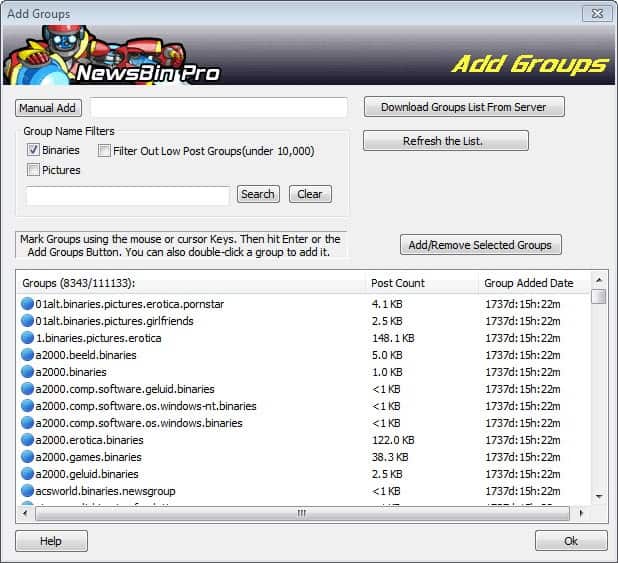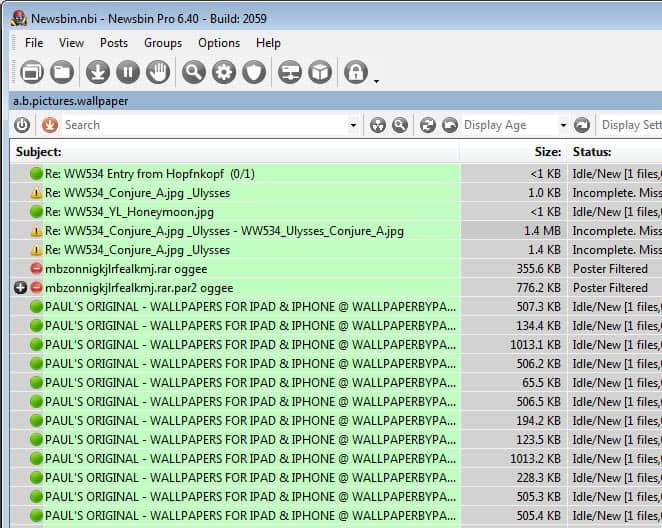Newsbin Pro 6.40 review

When I started to get interested in the Usenet, or newsgroups, I quickly worked my way through the available programs to find the best suited program for that. I tried many different programs at that time which all had their issues and flaws and finally found Newsbin Pro in 1999 I think it was. It was a commercial program even back in the days and while I preferred free software over commercial for obvious reasons, I decided to take the plunge and purchase the program.
Newsbin Pro has been on my computer ever since and I never looked back again. Before I start reviewing the program, I'd like to point out that you get lifetime upgrades with a purchase. You pay $20 once, that is the current price at least as shown on the website, to get all future updates free of charge. That in itself is a great deal in times where it is common that you need to pay an upgrade fee to upgrade to new (major) versions of programs.
Newsbin Pro is primarily a downloading tool for the Usenet which means that you need access to a Usenet account to use the software at all. Some Internet Service Providers give you access to the Usenet for free, but most of the time, you need to subscribe to a service like Giganews to get access to it.
First thing that you may want to do after installing the program on your system is to add a server to it. This is done via Options > Servers. Here you need to click on the new server button and add the server information that your Usenet provider provided you with. All it takes is usually to enter the server address, username and password.
You can modify a couple of advanced settings here, like using SSL for extra security, whether you want to block header downloads from the server or use it as a fill server only. I do not want to get into too many details here, but headers require some explanation.
Users post information to Usenet groups, and to retrieve the information, the Usenet client downloads headers of those posts first.This is similar to the option in desktop email clients to only retrieve headers first. A header offers information about the contents of the post, the name for instance that the uploader has given to it. So, you usually download headers first, browse through the list of posts the program retrieves for you, to download the items that you are interested in. Some providers support header compression which speeds up the process significantly (Giganews does).
Once you have added at least one server to the program, you can start adding groups to it. You do not need to do that, as you can also load nzb files directly into Newsbin Pro. NZB files contain information about posts made on the Usenet. When you load a NZB into the program, you provide it with information on how to download the data of that post. This is an excellent option to download data fast from the Usenet as you do not have to browse groups first to do so. Many popular Usenet indexing services like Binsearch support the creation of NZB files.
The majority of groups that you will be interested in are binary groups. These groups contain messages and attachments, as opposed to other groups where attachments are not allowed to be posted in. Binary groups always being with alt.binaries followed by one or multiple group names. There is for instance alt.binaries.mp3 for music posts, but also also.binaries.mp3.audiobooks where only audiobooks get posted in.
Note that I'm making no judgment on the legality of the posts to the binary groups. You will find posts that you can legally download but also copyright materials posted there.
To add groups to Newsbin, select Groups > Add Groups from the menu. This opens the groups browser. If this is your first start, you may want to click on the download groups list from server button to retrieve the latest list of Usenet groups from your provider.
You can use the search to find groups of interest or add groups manually if you already know a group that you want to add. I'd suggest you check the filter out low post groups box to hide groups with little activity. Each group is listed with its name, post count and the date it has been added.
To search all groups, uncheck the binaries check box at the top. This provides you with options to browse the non-binary groups as well which offer some interesting options. A large part of the Usenet consists of bulletin boards that are made available, which is like a very very big forum that everyone with access can participate in. This ranges from tech support over health discussion and fan-maintained groups to groups discussing politics, religion, and every other possible topic under the sun.
Once you have added at least one group you can start downloading headers. Hit Ctlr-a to select all groups, right-click and select download all headers or download headers from the context menu. This operation may take a while Depending on your connection, whether compression is supported, and the number of posts to the groups. Newsbin saves all header information to a local database so that you do not need to download already downloaded headers again next time you use the program.
You can double-click a group to list the posts that have been made to it. A search is provided at the top that you can make use of to filter results. You can also filter results by size or display age. Each post is listed with a subject, size, status information and date it has been posted to the group.
Some posts may be incomplete as you can see from the screenshot above. It is recommended to only download complete files from the Usenet. You may also stumble upon fake files and files containing malicious contents. Newsbin ships with a couple of options to protect you from some of those files. It will for instance block the download of double-archives by default (a RAR in a RAR), but gives you the option to bypass that restriction if you know what you are doing.
To download, simply double-click a file or highlight multiple posts at once and right-click the selection afterwards to select download. You can enable thumbnail previews in the software if you are downloading images which can be interesting as it gives you a first impression of the quality of a post. This can be a great way of taking a look at one or two images of a series of images to assess the quality of the posts.
Newsbin Pro ships with a set of features that improves the downloading significantly:
- It can automatically assemble archives and unpack them on the system.
- It can run Par2 recovery files to fix broken downloads.
- You can blacklist posters that spam the groups.
- You can configure a watch folder to load nzb files automatically in Newsbin Pro.
- It features a duplicate detector to prevent the downloading of the same files.
- You can limit the bandwidth or schedule downloads.
- Multi-server support, helpful if your main provider sometimes offers incomplete posts.
There is a lot more the program can help you with though. You can right-click any post to download and read the post body which usually consists of the message that has been posted by the user. You can also post to a group, for instance to participate in the discussion that is taking place. This is an excellent option for non-binary groups that you are interested in.
Verdict
Newsbin Pro is the number one Usenet tool for Windows. There are a number of reasons for that, including the dedication of the developers to integrate new features into the program, the lifetime upgrades you receive with a purchase, support for cutting edge features. and the feature-richness of the client itself. You can download a fully working ten day trial version from the developer website to test it for yourself.
Advertisement




















